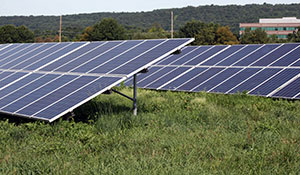Inflation Reduction Act Provides Tax Credits and Funding for Energy Efficiency and Renewable Energy Projects
Winter 2023

The Inflation Reduction Act is billed as the most significant action related to climate change ever taken by the US Congress. It was signed into law in 2022 and went into effect on January 1 of this year. In addition to billions in spending for vaccine, prescription drug, and other medical subsidies, it includes $370 billion for energy efficiency and clean energy projects that homeowners, businesses, non-profits, and governments can take advantage of. The Biden administration has a goal to reduce U.S. greenhouse gas emissions by 50-52 percent below 2005 levels by 2030, and the provisions in the IRA have been projected to generate a reduction of approximately 40% (prior to the passage of the IRA, the US was on track for a projected 24-35% reduction).
The provisions of the bill were designed to leverage the economic impact of these clean energy projects to intentionally support disadvantaged communities, address supply chain issues and incentivize production and manufacturing in North America, and to strongly incentivize good-paying jobs and apprenticeship opportunities. Some of the tax credits are income-qualified and are not available to the highest earners. The programs in the IRA are available through 2032, and this consistency will help make projects that take multiple years to develop more feasible, and more financeable.
A major change introduced in the IRA from previous tax credit programs is the inclusion of direct pay options for entities like non-profits and governments that have no tax liability. These entities can still benefit from many of the IRA's programs through "direct pay", which allows them to simply be re-imbursed by the IRS for the amount the tax credit would have provided.
The White House's Inflation Reduction Act Guidebook is a good resource for those looking to take advantage of funding and credits available, and a summary of the main programs is below. Please note that some guidelines have not yet been finalized by the IRS; please consult a tax expert.
For individuals:
- Energy Efficient Home Improvement Tax Credits this is an expansion of a previous tax credit whose lifetime cap had been $500; now there is an annual cap of $1,200. Improvements eligible for this tax credit include insulation, windows, exterior doors, and home energy audits. Central air conditioners, water heaters, furnaces and boilers are also eligible for a 30% credit up to $600. Additionally, improvements like electric or natural gas heat pumps, biomass stoves and boilers are eligible for a 30% tax credit with no dollar limit cap.
- Residential Clean Energy Property Credit a 30% credit on expenses of installing solar panels and back-up battery storage, solar hot water heaters, geothermal heat pumps, fuel cells, and small wind turbines at residential properties. There is no annual or lifetime dollar limit.
- Clean Vehicle Tax Credit up to a $7,500 tax credit for new electric vehicles purchased between 2023-2032, and up to a $4,000 tax credit for used electric vehicles. This program has income requirements and a number of requirements vehicles must meet, including an MSRP below $80,000 for trucks, SUVs and vans and below $55,000 for other vehicles.
Check out the IRS's FAQ for more information on tax credits for residential projects.
For governmental agencies, non-profits, and businesses:
- 179D Commercial Buildings Energy Efficiency Tax Deduction New construction or improvements to existing commercial buildings are eligible for this tax deduction if energy usage intensity can be demonstrated to be reduced by at least 25% below certain baselines. This existing program was extended and expanded, increasing the credit from up to $1.88/SF to up to $5.00/SF if the project meets prevailing wage and apprenticeship requirements (the deduction is reduced to $1.80/SF if those requirements are not met). Buildings owned by governments and non-profits can be eligible if the tax deduction is taken by the designer/contractor and passed through.
- Section 48 Investment Tax Credit The Inflation Reduction Act modifies and extends the current ITC through 2023 and 2024, at which point it sunsets in favor of technology-neutral, emissions-based credit, the Clean Electricity ITC. Both the extended and new tax credits will range from 6%-50% or more of project costs. Eligible project types under the new credit include solar, geothermal heat pumps, small wind turbines, combined heat and power systems, microgrids, and energy storage (battery) systems. The Investment Tax Credit (ITC) is eligible for direct pay, making tax exempt entities able to take advantage. The base tax credit increases from 6% to 30% if a project meets prevailing wage and apprenticeship requirements.
- Production Tax Credit a per kilowatt-hour (kWh) tax credit for electricity generated by solar and other qualifying technologies for the first 10 years of a system’s operation. The Inflation Reduction Act modifies and extends the current PTC through 2023 and 2024, at which point it sunsets in favor of technology-neutral, emissions-based credits through the Clean Electricity PTC. The Production Tax Credit (PTC) is eligible for direct pay, making tax exempt entities able to take advantage. Project developers generally must choose between claiming either the ITC or PTC.
- Commercial Clean Vehicle Credit- Tax credit of up to $40,000. Each vehicle credit is between $2,500-$7,500. Whichever is less: 15% of your basis in the vehicle (30% if the vehicle is not powered by gas or diesel), or the incremental cost of the vehicle. This credit is eligible for direct pay, making it available to both tax-paying and non-tax paying entities. For businesses, credits are non-refundable.
- Rural Energy for America Program (REAP) provides guaranteed loan financing and grant funding to agricultural producers and small businesses in eligible rural areas for renewable energy systems or to make energy efficiency improvements. Eligible projects include renewable energy systems, such as anaerobic digesters, geothermal for electric generation or direct use; hydropower; small and large wind generation; solar; and efficiency improvements. The IRA increased grant award amounts from 25% to 40%. Applications due on 3/31/23.

